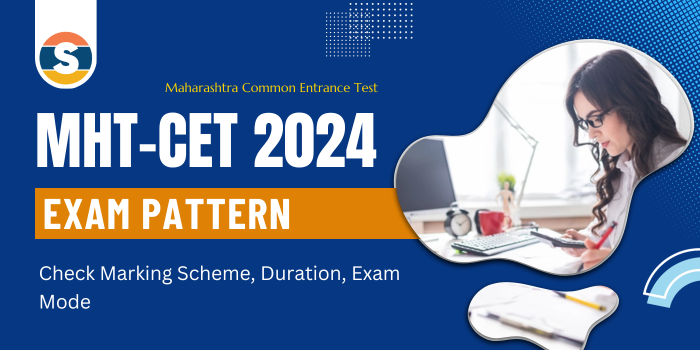
MHT CET Exam Pattern 2024, Marking Scheme, Total Marks, Topic-wise Weightage
MHT CET Exam Pattern 2024 – The MHT CET is conducted online in a computer-based test format. The MHT CET Exam Pattern 2024 will be released by the Maharashtra State CET cell on their official website along with the Information Brochure. The Exam Pattern of MHT CET includes number of questions, total marks, exam mode, marking scheme, passing marks, question and more.
It is important for candidates taking the MHT CET 2024 also to understand the MHT CET Syllabus. Knowing both the exam pattern and syllabus will aid in effective exam preparation.
MHT CET 2024 Exam Pattern
Before proceeding with the MHT CET exam pattern 2024, let us check the MHT CET exam overview tabulated below.
| Overview | Specifications |
| MH CET Full Form | Maharashtra Common Entrance Test (MHT CET) |
| Exam Conducting Body | State Common Entrance Test Cell, Maharashtra |
| Mode of Exam | Computer-Based Test (CBT) |
| Number of Papers | PCM (Physics, Chemistry, Mathematics)
PCB (Physics, Chemistry, Biology) |
| Sections | Section 1- Physics and Chemistry
Section 2- Mathematics / Biology |
| Language | English/ Urdu/ Marathi (Mathematics will be in the English Language only) |
| Duration | 90 Minutes for each paper |
| Type and Number of Questions | 150 MCQs (50 Questions for Each Section) |
| Total Marks | 200 Marks |
| MHT CET Exam Marks Distribution | – Mathematics: +2 Marks for every correct answer
– Physics, Chemistry and Biology: +1 Mark for every correct answer – No Negative Marking |
| MH CET Official Website | cetcell.mahacet.org |
MHT CET 2024 Paper Pattern and Marking Scheme
The MHT CET exam is divided into papers: Paper 1 and Paper 2.
Paper 1 will include Physics and Chemistry, which is common for both PCM and PCB groups,
Paper 2 will be Mathematics or Biology.
As per the notification, 20% weightage will be given to the syllabus from Class 11, while 80% weightage will be given to the syllabus from Class 12.

Check the table below to know the MHT CET 2024 exam pattern:
- Two marks will be given for every correct answer in Mathematics.
- One mark will be given for every correct answer in Physics, Chemistry and Biology.
- There will be no negative marking for wrong answers.
- No marks will be deducted for unattempted questions.
| Papers | Time Duration | Number of Questions | Marks | Marks per Question | Negative Marking |
| Paper I (Mathematics) | 90 Min | 50 Questions | 100 | 2 Marks each for every correct answer | No |
| Paper II (Physics and Chemistry) | 90 Min | 100 Questions | 100 | One mark each for every correct answer | No |
| Paper III (Biology) | 90 Min | 100 Questions | 100 | One mark each for every correct answer | No |
Difficulty Level of MHT CET 2024
The MHT CET exam is recognized as a highly competitive entrance test in Maharashtra, comparable in difficulty to JEE Mains. Judging from past question paper patterns, the questions are based on Maharashtra State Higher Secondary Education syllabus but the difficulty level is expected to be moderately tough.
The MHT CET Biology Question Paper is similar to the questions asked in NEET.
MHT CET Exam Pattern 2024 – Key Points
Candidates must know the important MHT CET points before appearing for the exam:
- The entrance exam will comprise 2 papers – Paper-I (Physics and Chemistry)) and Paper II (Mathematics/ Biology).
- The difficulty level of the examination for Mathematics will be similar to JEE Main exam, whereas, for Physics, Chemistry, and Biology, the difficulty level will be similar to NEET.
- The MHT CET question paper 2024 will be prepared based on the Maharashtra State Board of Secondary and Higher Secondary Education syllabus.
- As mentioned in the notification, 20% weightage will be given to the 11th standard syllabus and 80% to the 12th standard syllabus while setting the question paper.
- There will be no negative marking.
MHT CET 2024 Syllabus
In the question paper 20% weightage will be given to the 11th standard syllabus and 80% to the 12th standard syllabus. Hence, the syllabus of 11th and 12th standard becomes important.
Class 11th Syllabus
| Physics | Chemistry | Mathematics | Biology |
|
|
|
|
Class 12th Syllabus
| Physics | Chemistry | Mathematics | Biology |
|
|
|
|
MHT CET Exam Pattern 2024 FAQs
Q. What are the subjects asked in MHT CET 2024?
A. The MHT CET 2024 includes multiple-choice questions in Physics, Chemistry, Biology/Mathematics.
Q. How are the questions distributed in MHT CET 2024?
A. The Physics and Chemistry section has 50 questions each, the Biology paper has 100 Questions and the Mathematics paper includes 50 questions.
Q. Are there negative marks for wrong answers in MHT CET 2024?
A. There is no negative marking for incorrect answers in the MHT CET 2024 exam.
Q. Are marks awarded/deducted for leaving a question unmarked?
A. No marks are awarded/deducted for leaving a question unmarked in MHT CET 2024.
Q. Is the MHT CET exam difficult?
A Yes, the MHT CET exam is considered challenging and on a similar difficulty level as JEE Main 2024.
Conclusion
Aspirants can prepare better when they are well-acquainted with the exam pattern.
The MHT CET exam is divided into papers: Paper 1 and Paper 2. Paper 1 includes Physics and Chemistry, which is common for both PCM and PCB groups, Paper 2 includes Mathematics or Biology. PCM Group candidates need to solve 150 questions in 180 minutes while PCB Group candidates need to solve 200 questions in 180 minutes.
Also See :
- MHT CET 2024
- MHT CET Registration 2024
- MHT CET Exam pattern 2024
- MHT CET Eligibility criteria 2024
- MHT CET Syllabus 2024